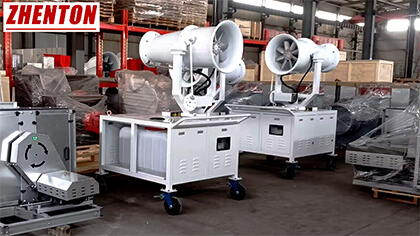What are the ideas for dust
suppression?
Dust control is a critical aspect of maintaining a safe and
efficient working environment in industrial and construction
sites. Uncontrolled dust can pose significant health risks to
workers, contribute to environmental pollution, and lead to
costly equipment damage and maintenance. Implementing
effective dust control solutions is essential to mitigate these
risks and ensure regulatory compliance.
How can we prevent dust in industry?
For many industrial and construction environments,
combining water spraying or misting with chemical
suppressants and mechanical dust collection systems
often provides the most comprehensive dust control.
Regular maintenance, proper ventilation, and good
housekeeping practices further enhance the effectiveness
of these methods.the best dust control method depends
on the specific conditions and requirements of the site.
Assessing the dust sources, environmental factors, and
operational needs is crucial in designing an effective

calcium chloride for dust control?
Calcium chloride is commonly used for dust control,
particularly on unpaved roads, construction sites, and
other areas with loose soil or gravel.Using calcium
chloride for dust control is an effective and economical
method, provided it is applied correctly and with
consideration of environmental and safety factors.
→Concrete Batch Plant Dust Control
Considerations
1.Concentration and Application Rate: Proper concentration
(usually around 35% for liquid solutions) and application
rate (typically 0.27 to 0.68 liters per square meter) are
crucial for effectiveness.
2.Weather Conditions: Its effectiveness can vary with
weather conditions. It works best in moderately humid
conditions, as it relies on moisture to function.
3.Potential Corrosion: Calcium chloride can be corrosive
to vehicles and infrastructure, so it’s essential to rinse
vehicles and equipment that come into contact with
treated surfaces.
→Plain Water Dust Suppression System
What is the most effective dust control?
By implementing a combination of these strategies,
industries can effectively prevent and control dust,
ensuring a safer and healthier work environment.
Dust control solutions are vital for protecting health,
the environment, and operational efficiency. Inhalation
of dust particles can lead to respiratory issues like
silicosis and asthma, while environmental
contamination can affect soil, water, and air quality.
Additionally, dust can cause wear and tear on machinery,
leading to increased maintenance costs and downtime.
Regulatory compliance is another critical aspect, as many
industries must adhere to strict air quality and dust
emission standards. Implementing effective dust control
measures helps mitigate these risks and maintains a
safer and more productive workplace.
Dust Suppression Misting Cannons are particularly
effective tools for controlling airborne dust. These
machines generate a fine mist that captures and settles
dust particles, preventing their spread. They are versatile
and can be used in various settings, including
construction sites, mining operations, recycling plants,
and industrial facilities. The advantages of Misting Cannons
include their high efficiency in reducing airborne dust,
their versatility across different industries, and their
mobility, which allows for easy relocation. While the initial
fog cannon price may be high, their efficiency and
durability often result in long-term cost savings. Factors
to consider when evaluating Fog Cannon Prices include
the size and coverage area, water consumption, durability,
and additional features such as remote control and
adjustable spray angles.
→Dust Suppression on Construction Sites










